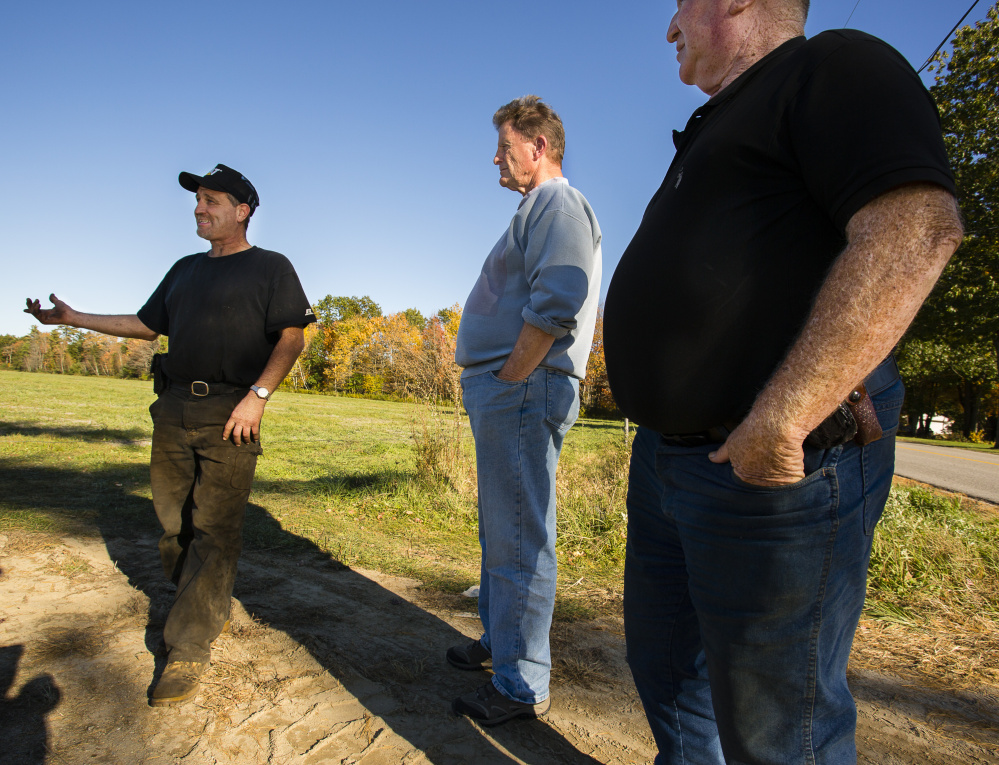A putrid stench that has permeated parts of York County since Tuesday is coming from a farm and composting business in Arundel that is operating in violation of local and state rules, officials said.
However, a company official said the business owners are merely trying to keep their hayfields healthy by covering them with a combination of compost and chicken manure. He blamed adverse weather conditions for the smell and said the business is operating within its rights.
Dubois Livestock & Excavating Inc. at 2 Irving Road treated its hayfields with a material that created the odor, said Mike Clark, an environmental specialist with the state Department of Environmental Protection, who visited the Dubois property Wednesday to follow up on numerous complaints.
“They refused to talk to me,” Clark said. “They refused to let me on the premises.”
Clark believes the material spread on the fields is mostly compost, which in itself is not a violation. However, DEP rules say compost must be sufficiently cured so it does not create a “nuisance odor.”
Since Dubois refused to let him inspect the site, Clark said the DEP is determining what its next step will be toward getting the business to comply with state rules.
“We prefer voluntary compliance,” he said, “but voluntary compliance starts with communication.”
Sol Fedder, an officer and director of Dubois, said the compost has been cured to reduce the odor, and that easterly winds and a lack of rain are what caused the smell to spread and linger this week, sparking complaints from residents in Saco, Biddeford and Old Orchard Beach.
“We have to use something to make the grass grow,” he said. “If we had something that smelled nicer, we’d use that.”
Dubois also is in violation of a town ordinance for operating its composting business on an expired conditional-use permit, said Arundel Town Planner Tad Redway.
The town decided not to renew the permit in 2011 after Dubois refused to comply with certain required conditions, according to documents filed in Maine Supreme Judicial Court. When Dubois did not cease its composting operations, the town sued and won in York County Superior Court.
The business appealed the decision to the Supreme Judicial Court, arguing that the town did not have proper jurisdiction to bar it from operating, but the court ruled in favor of Arundel.
Still, Dubois has not stopped making compost. Its website touts the business as “Maine’s largest agricultural compost facility” and promotes the fact that its compost includes shellfish. The company also raises pigs and rabbits, sells firewood and offers excavation and demolition services. Customer testimonials on the site praise the quality of Dubois’ compost and topsoil.
But neighbors say the periodic stench has been getting worse in recent months, and that they have had enough. One group of nearby residents, who asked not to be named, has been distributing fliers encouraging others to file complaints with local and state officials.
“We encourage you to call these folks whenever you have had enough of the stink and make your concerns known,” the fliers say. “Call, and keep calling every time you are offended by the smell until the town and state authorities take a stand and hold Dubois accountable.”
Arundel Town Manager Keith Trefethen said the town is not giving up. It has filed a second lawsuit against Dubois and Randrick Trust, the legal entity that owns the business, in an effort to enforce the previous court order.
“Right now they have no permit,” Trefethen said. “The remedy we have is to go back to court.”
Fedder said a new amendment to the Maine Agriculture Protection Act that takes effect Monday should exempt Dubois from town ordinances, which is what the business plans to argue in court.
“There’s nothing wrong with what we’re doing, and it’s exactly right what we’re doing,” he said.
Fedder said Dubois did not allow the DEP to inspect its fields Wednesday because its owners have a long-standing “personal dispute” with Clark, the environmental specialist.
“We’ve had a history with the DEP guy,” Fedder said.
Clark said he has responded to neighbor complaints about odor from the farm several times in the past year, but there is nothing personal about it. He said it’s merely a case of one company refusing to comply with state rules.
“They don’t like being regulated – they’ve made that clear,” he said.
Send questions/comments to the editors.





Comments are no longer available on this story